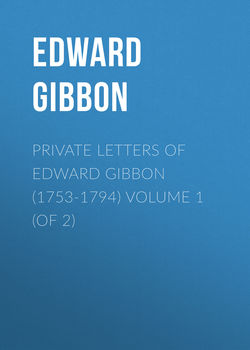Читать книгу Private Letters of Edward Gibbon (1753-1794) Volume 1 (of 2) - Эдвард Гиббон, Edward Gibbon - Страница 22
19.
To his Stepmother
ОглавлениеDevizes, February the 14th, 1762.
Dear Madam,
Knowing you as I do I can easily judge of the effect my father's accident must have produced upon you. Besides, I can guess at it by the impression it made upon me, though I heard of the danger and the escape at the same time. I thank God it was no worse. I hope my father is now thoroughly recovered. I shall remember the Arquebusade this week.
Of myself and my situation at the Devizes I have little to say, and that little not very agreeable. A great deal of noise and no conversation, a great many people and no society, a most excessive familiarity and no friendship; in a word, the usual scene, only I think we are not so quarrelsome as we used to be.
I wrote to my father who by this time must have received my letter. However I must just mention to him two or three things relative to the battalion. He will see by the enclosed return, our strength and what we have done, which is nothing to what we might do had we money. The Blacks[26] now grow so numerous that I think they must drive us out of town, they desire it so strongly, & Lord Shelbourne[27] has such powerful interest. I believe Sharrock[28] will get an ensign, one Hall,[29] near this place, a very pretty lad of sixteen with a good qualification, though not in our county. He expects an answer from Durnford, who, by the bye, has not yet wrote either to Harrison[30] or me.
How does your pupil go on? I hope soon to have an account of him, as William is very clamourous for a new livery.
You say nothing of your brother. I hope he is sailed. Surely it must by this time be determined. I beg you would present my love and duty to my father, and believe me,
Dear Madam,
Most affectionately yours,
E. Gibbon, Junior.
Footnote_26_26
The Black Musqueteers of Colonel Barré were raised in 1761-2 as the 106th Regiment of Foot (or Black Musqueteers.) See List of General and Field Officers for 1763, p. 175.
Footnote_27_27
William, Lord Fitzmaurice, M.P. for Chipping Wycombe, afterwards Prime Minister (1782), and first Marquess of Lansdowne, succeeded his father as second Earl of Shelburne in the spring of 1761. He acted as the go-between in the negotiations between Bute and Fox, which led to the cessation of the Seven Years' War and the Treaty of Paris.
Footnote_28_28
Robert Sharrock was a captain in the South Battalion of the Hampshire Militia.
Footnote_29_29
James Hall received his commission as ensign in February, 1762.
Footnote_30_30
John Butler Harrison, lieutenant in the South Battalion, was Gibbon's chief friend in the regiment. In his journal Gibbon speaks of the disagreeable society in which he was compelled to live. "No manners, no conversation, they were only a set of fellows, all whose behaviour was low, and most of whose characters were despicable. I must, however, except Sir Thomas and Harrison out of this society. Harrison is a young man of honour, spirit, and good nature. The virtues of his heart make amends for his having none of the head."
